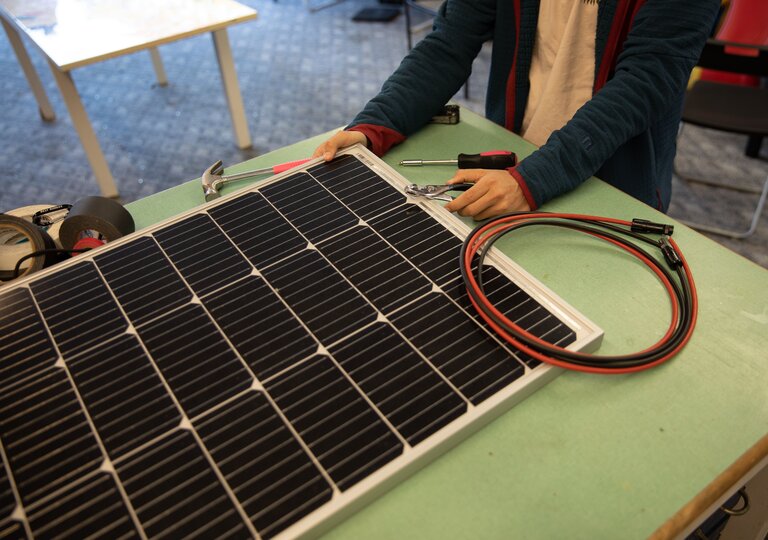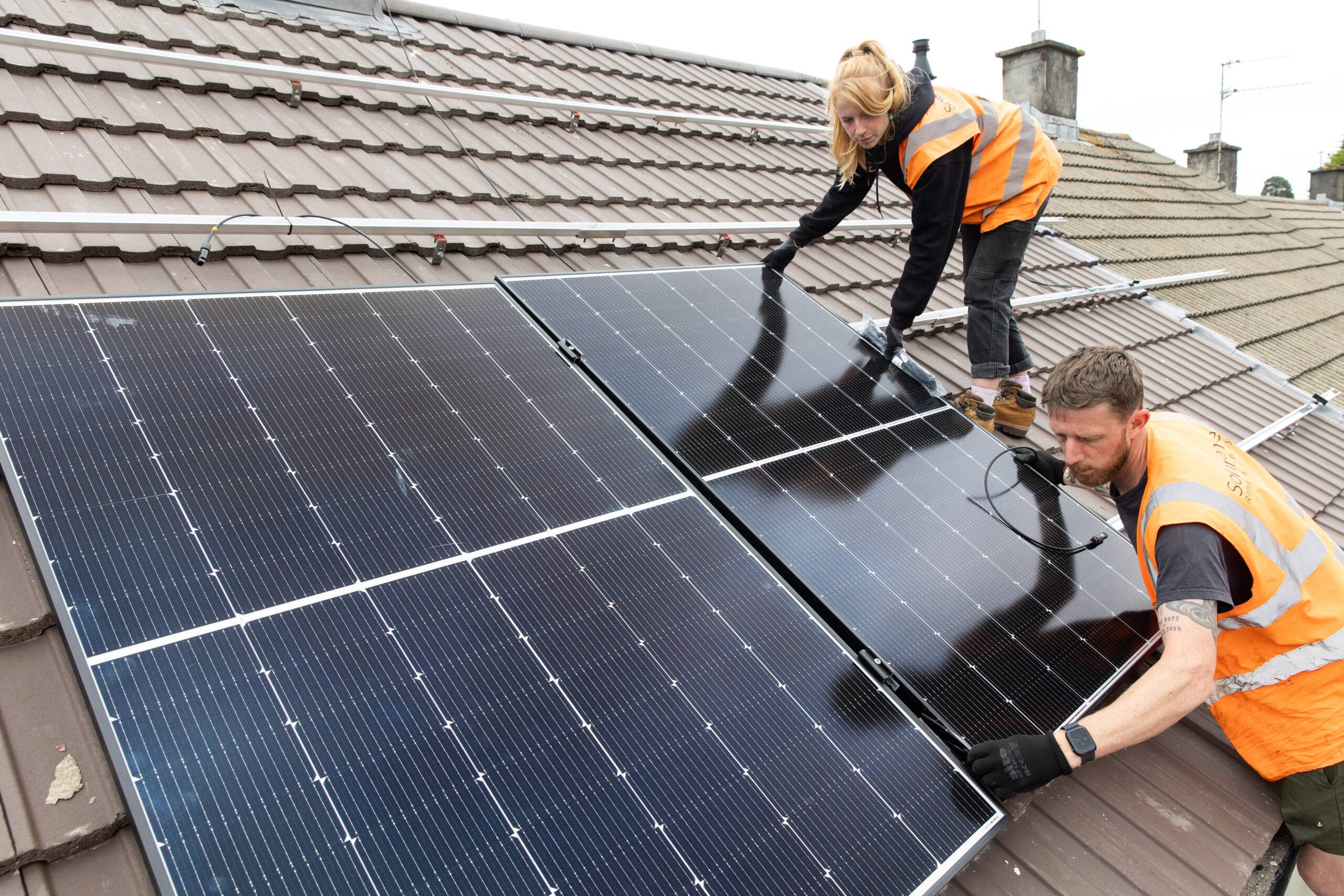Electrotechnicians and electricians in domestic retrofit
Guidance on the opportunities in for electrotechnicians and electricians in the retrofit sector.

Electrical skills are important to retrofitting domestic buildings. This guide offers information on entry routes into electrical careers as well information on how experienced professionals in the industry can broaden their career with further training in retrofit.
The demand for retrofit in electrical skills
Around 1.3 million households in the UK have solar energy systems installed in their homes. Solar technology has increased in popularity due to its impact on reducing households’ energy costs and carbon footprint, and has been made more affordable by government finance schemes and falling costs in technology. The growth of solar panels in the UK offers electricians new and exciting opportunities in installation and maintenance of solar technology and also Electrical Energy Storage Systems (EESS). EESS can store energy produced from solar panels during the day in a battery so that it can be used at a later time. There is also the potential to sell unused electricity back into the National Grid.
Research estimates that low-carbon electricity generation, including installing and maintaining solar panels, is estimated to create 3,500 additional jobs in the West of England in 2030. The MCS Foundation, who approve solar contractors and installation work, reported a 30% increase in both the number of contractors and solar installations between 2022 and 2023.

Entry routes into the industry
Apprenticeships combine practical training with work through a paid job alongside formal study. Apprentice electricians will be expected to work around 30 hours per week and spend the rest of their time with their training provider. There are two types of electrician apprenticeships: Installation and Maintenance Apprenticeship for industrial, commercial, and domestic settings, or the Domestic Electrician Apprenticeship specialising in homes and dwellings. Further details of each are listed below:
Course: Level 3 Installation and Maintenance Electrician Apprenticeship
Length: Usually 4 years
Eligibility: 16+ years old. 5 GCSEs at Grade 4 including English Language and Maths, or full Level 2 course with Functional Skills.
Course: Level 3 Domestic Electrician Apprenticeship
Length: Usually 3 years
Eligibility: 16+ years old. GCSE Maths and English grade 4+, however if you do not already hold these you will be expected to achieve them as part of your apprenticeship.
Over 3-4 years, apprentices build practical skills and knowledge both on the job and with a training provider to build towards taking a final assessment known as the AM2S.
You can view more information on apprenticeships on our Skills Connect page, or for more specific information on electrical apprenticeships, view Go Construct’s ‘complete guide to electrician apprenticeships’.
For people without experience looking to become an electrician, the Electrical Careers website highlights a Level 3 qualification (NVQ or Apprenticeship) with practical work-based experience. This forms the comprehensive training needed to complete the assessment (AM2S or AM2) which is required to become an electrician. College qualifications can be a good basis which build towards obtaining a Level 3 NVQ or moving onto an Apprenticeship. For more information on the different training routes, visit the Electrical Careers website.
Examples of training:
Course: Level 2 (followed by Level 3) Diploma in Electrical Installations
Length: Level 2 and 3 - each take one year to complete
Eligibility: All ages. Level 2 (GCSE English and Maths at Grade 4+) Level 3 (5 x GCSEs at 4+ or the Level 2 Certificate)
Further Opportunities: Either progress to become a qualified electrician with a Level 3 Apprenticeship or NVQ such as Diploma in Installing Electrotechnical Systems and Equipment (Buildings, Structures and the Environment).
Course: T-level in Building Services Engineering for Construction (Level 3) offers routes to specialise in electrotechnical engineering
Length: 2 years
Eligibility: 16-19-year-olds, usually requires 4-5 GCSEs at grades 9 to 4 (A* to C) or equivalent, including English and Maths
Further Opportunities: T-levels earn UCAS points which could help you progress to Higher Education such as a degree in Building Services Engineering. You could also progress to employment or a traineeship; undertaking an accelerated or higher apprenticeship, or expand your skillset into retrofitting (see next section: Further Training in Retrofit). For more information, view the progression profile provided by the Institute for Apprenticeships and Technical Education.
Some people apply for a job as an electrician’s assistant to gain on-the-job training by working alongside a professional electrician.
Further opportunities for experienced workers: Your employer may support you to train to become fully qualified. Formalising your work experience with industry-recognised qualifications can both broaden employment prospects and increase further training opportunities, such as installing renewable technology.
The Experienced Worker Assessment (EWA) offers existing workers the opportunity to apply their existing experience to assessment criteria to gain an industry-recognised Level 3 qualification. There are 2 EWA routes: Installation Electrician and Domestic Electrician. A wider description of the Installation EWA is listed below:
Course: City and Guilds Level 3 Electrotechnical Experienced Worker Assessment for Installation and Maintenance
Eligibility: Intended for people who have been working in the industry for 5+ years but have not formally completed an industry apprenticeship or equivalent Level 3 NVQ qualification.
Further opportunities: Possible progression of installation training for renewable technologies such as solar or electrical energy storage systems.
Further training in retrofit
Learn to specialise in installing and maintaining Solar PV. These technologies capture the sun’s energy and convert it into electricity -you can learn more about how they work on the Energy Savings Trust website.
View a range of training providers in the West of England offering Solar PV training in the Skills Connect Directory. Training options differ in length and formality, some examples include:
Course: LCL (Level 3) Award in the Installation and Maintenance of Small Scale Solar Photovoltaic Systems
Length: 3 days
Eligibility: Applicants need to hold a Level 3 Award in the Requirements for Electrical Installations plus a Level 3 Award in the Initial Verification and Certification of Electrical Installations or a combined award including Periodic Inspection & Testing
Course: Skills Bootcamps (various skills in renewable technologies)
Length: Varies (usually 60 hours spread over several weeks)
Eligibility: 19+ years old. Skills Bootcamps are free to learners. You can view the latest Skills Bootcamps in the Skills Connect directory.
Some training offers combine more than one renewable technology, see example below under ‘Energy Storage’.
Specialise in the installation of Electrical Energy Storage Systems that store energy collected from renewables in the home to use at a later time or sell to the Grid. More detailed information about energy storage systems can be found on the Energy Savings Trust website. Example of training include:
Course: EAL Level 3 Design, Install & Commission Electrical Energy Storage Systems (EESS)
Length: 3.5 days
Eligibility: A Level 3 in relevant electrotechnical qualification and Level 3 Requirements for Electrical Installations or equivalate
Combined courses offer training in more than one renewable technology, for example:
Course: LCL Level 3 Award Small Scale Solar Photovoltaic Systems and Electrical Energy Storage Systems (5 days)
Length: 5 days
Eligibility: Level 3 Award in the Requirements for Electrical Installations and Level 3 Award in the Initial Verification and Certification of Electrical Installations or a combined award including Periodic Inspection & Testing (or equivalent).
View a range of training providers in the West of England that offer training in Electrical Energy Storage Systems on the Skills Connect Directory.
You may be interested in building confidence in roofing to support new Solar PV installation skills. Example training includes:
Course: Solar installation roof awareness
Length: 2 days
Eligibility: Intended for roofers, builders, plumbers, electricians who are competent in working at height.
There are a variety of courses designed to teach the basic principles of retrofit. These types of courses are useful for lots of can help to identify areas of interest. Some examples are:
Informal Training:
Course: Retrofit 101 (online)
Length: 2 hours
Eligibility: Open to everyone and free.
Formal Training:
Course: Level 2 Award Understanding Domestic Retrofit (online)
Length: 30hours (self-paced)
Eligibility: Open to everyone.
New job roles have been developed to support the retrofitting process, along with specific training requirements. Note many of these courses are partially or fully funded. Below are the job roles and examples of relevant training:
Retrofit Assessor Role
Completing property surveys to improve energy efficiency.
Training: Skills Bootcamps - Level 4 Award in Domestic Retrofit Assessment
Length: Usually 60 hours across 10 weeks (online)
Eligibility: Level 3 Domestic Energy Assessor qualification (if you do not have this already there are combined courses available).
Retrofit Advisor Role
Providing independent advice to residents on how to retrofit their home.
Training: Level 3 Certificate in Domestic Retrofit Advice
Length: 30 hours (online)
Eligibility: 18+ years
Retrofit Coordinator Role
Retrofit Coordinators manage retrofit projects including procurement, specification, and delivery.
Training: Skills Bootcamp - Level 5 Diploma in Retrofit Coordination and Risk Management
Length: 103 hours across 13 weeks
Eligibility: A Level 3 qualification in the built environment
View a range of training providers offering retrofit training in all these areas and more in the Skills Connect Directory.
There are further opportunities in Electric Vehicle Charging Equipment (EVCE) in both residential and commercial settings. You could train to install the infrastructure required to support the increased take up of electric vehicles. Example of training include:
Course: City & Guilds Level 3 Award in the Design and Installation of Domestic and Small Commercial Electric Vehicle Charging Installation
Length: 2 days
Eligibility: A Level 3 in relevant electrotechnical qualification
View a range of training providers in the West of England that offer training in Electrical Vehicle Charging Equipment courses on the Skills Connect Directory.
Solar Panel Installer
- Median Advertised Salary £35K
- 140 job postings in the region in 2023
- Specialised Skills: Solar Energy Systems, Batteries, Electrical Systems, Electrical Wiring, Renewable Energy, Roofing
- Soft Skills: Communication, Customer Service, Planning, Operations, Problem-solving
- For more information about the role of a Solar Panel Installer visit Go Construct

Finding Support
Professional organisations offer industry specific support, such as career advice, training, membership schemes, and networking opportunities, as well as support with industry regulations or developments. Here are some organisations relating to the electrical industry and retrofit:
The Electrotechnical Skills Partnership (TESP) is a not-for-profit skills partnership created by ECA, Joint Industry Board (JIB), National Electrotechnical Training (NET), SELECT and Unite the Union.
Electrical Contractors Association are the UK’s leading trade association for the electrotechnical services industry.
The Association for Renewable Energy and Clean Technology is a not-for-profit trade association providing the latest information on policy updates, sector-specific insights, topical briefings and industry-leading training/events.
RetrofitWest are the local service set up to support the development and growth of the retrofit market in the West of England. They offer advice and guidance, events, networking, fully and partially funded courses, as well as a directory of local retrofit professionals to link customers and suppliers together.
MCS Foundation sets, defines and maintains the Standards for low-carbon energy technology products, contractors and their installations. This includes heat pumps, solar, biomass, small wind and battery storage. They list the skills courses
Electrical Competent Person Scheme is the government approved contractor scheme.
Solar Energy UK is an established trade association working for and representing the solar and energy storage value chain.
Electrical Careers website offers industry related careers and training information and advice.
Explore further pathways into domestic retrofit
Explore some of the other career pathways in domestic retrofit, for new starters or experienced professionals looking to train up.

Talk to a friendly advisor
Feeling overwhelmed or not sure where to start? We’re more than a website, we have real people waiting to help with all your skills, training and career needs.